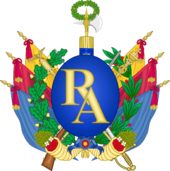User:IEPH/Sandbox/AusoniaRewrite
This article is incomplete because it is pending further input from participants, or it is a work-in-progress by one author. Please comment on this article's talk page to share your input, comments and questions. Note: To contribute to this article, you may need to seek help from the author(s) of this page. |
Ausonian Commonwealth République ausonienne (French) | |
|---|---|
| Capital | Châlons |
| Largest city | Savonnes |
| Official languages | French |
| Recognised regional languages | |
| Demonym(s) | Ausonian ausonien |
| Government | Federal diarchic parliamentary republic |
| Elmire Aslane | |
| Victoire Martin | |
| Legislature | Senate |
| House of Peers | |
| House of Commons | |
| GDP (PPP) | 2020 estimate |
• Per capita | $46,827 |
| GDP (nominal) | 2020 estimate |
• Per capita | $38,272 |
| Gini (2020) | 28.7 low |
| HDI (2020) | .935 very high |
| Currency | Ausonian livre (AUL; ₤) |
| Date format | dd.mm.yyyy (AD) |
| Driving side | left |
| Calling code | +33 |
| Internet TLD | .au |
Ausonia (French: Ausonie), officially the Ausonian Commonwealth, is a sovereign nation in southwestern Adria. It is bounded by ?? to its north, the Eurythic Ocean to its west, ?? to its south, and Aldria and Prinzipina and ?? to its east. It is a federal republic comprised of ?? provinces, two free cities, and two federal territories, in addition to six constituent territories scattered throughout the world, with Châlons as the seat of the federal authorities. The country's topography is largely varied between its southern mountain chains, including some of the tallest mountains in Adria, and the flat northern plains, where a slight majority of its population of ?? reside.
(...rewrite history...)
A largely Valessic country, Ausonia today is a cosmopolitan, religiously diverse, and multilingual society, with numerous regional identities stemming from linguistic differences and the Catholic-Protestant axis. Though a majority of Ausonians are speakers of various Oïl dialects, Ausonian identity is rooted in a common historical and geographical background and shared values such as federalism and direct democracy.
Ausonia is also a developed, high-income economy, dominated primarily by the service and financial sectors. It is one of the top countries in the world in terms of economic competitiveness, thanks to its advanced infrastructure and strong work ethic. Owing to their individualistic mindset forged over the centuries, there is a strong emphasis on self-reliance and personal responsibility, with welfare services generally small compared to its neighbors. Despite this, Ausonians generally enjoy a high standard of living and quality of life.
History
Etymology
The origins of the name "Ausonia" predate the emergence of the Valessian Empire and come from the Greco-Latin name to denote the Aurunci, a Auseno-Celtic people that inhabited much of southern and south-central Ausonia, near present-day Savonnes. The original name is of uncertain origin, but it was generally after the initial Valessian conquest of their territory that the term spread to encompass much of present-day Ausonia, eventually adopted as a regional term by the Auseno-Roman population. The subsequent evolution of the Romance languages, and the Oïl dialects in particular changed the term to modern Ausonie.
The official name for the state is République ausonienne. The term originated from the Latin res publica ("common/public thing") and is traditionally rendered as the "Commonwealth", which is an English calque. It predates the modern usage to denote a republic (though the country has also been a modern republic since 1848)
Early history
Middle Ages
The War of Unification
19th and 20th centuries
Recent history
Geography
Climate
Biodiversity
Government
Direct Democracy
Law
Subdivisions
Constituent territories
Military
Foreign Relations
Economy
Energy
Transportation
Demographics
Religion
Language
Education
Health
Culture
Art
Music
Architecture
Cuisine
Media
The freedom of the press and the right to free expression are both guaranteed in Article 1 the Ausonian constitution, which provides the bedrock for a flourishing media industry that is the largest in Adria. In particular, the country boasts a large and well-developed television market, with the vast majority of Ausonian households - over 90% - having access to satellite or cable television broadcasting a wide range of free-to-air public and commercial stations. The most prominent television networks include the ARF network of regional public broadcasters, as well as the commercial broadcasters Antenne 3, TAL, Telecinq, and La 7. Due to the variety of regional languages, imported TV programmes and interviews with responses in a foreign language, are virtually always shown with the original audio and subtitled, with the main exception being programmes directed to children.
Ausonia historically boasted the greatest number of newspaper titles published in proportion to its population and size, commonly divided into broadsheets and tabloids that appeal to certain sectors of society and are often affiliated with the major parties. The most popular newspapers include the newspapers of record Le Standard and Le Post, as well as Courrier de la Patrie, and sports paper L'Équipe. Over the past two decades, free dailies have made a breakthrough, the most popular of which are Metro and En Direct. Weekly magazines have a much stronger and more diversified reader base, with more than 350 specialised weekly magazines published in the country.
Sports
Units of Measurement
Unlike most countries in Adria, Ausonia maintains its own units of measurement that are holdovers of the old system of measurements used in the Kingdom, spreading to the rest of the country after the War of Unification before being updated numerous times to the present.
The metric system on the other hand, has been steadily gaining some acceptance among Ausonians, being used for distances (especially on expressways to other countries) and temperature. Attempts to start the full process of metrication have either stalled in Senatorial committees or were defeated in federal initiatives, the last major attempt being in 2004.


